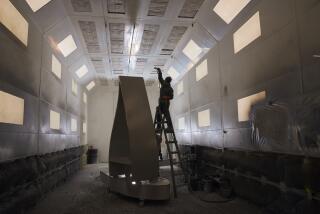High-Wire Workout : It Takes DWP Pole Climbers Years to Reach the Top of Their Line
- Share via
“It takes a weird duck to climb a pole,” said Denny E. Poplawski. “I can say that because I used to do it.” But those “weird ducks” are doing a crucial job, added Poplawski, who now supervises the instructors at a training facility in Sylmar for aspiring electrical power pole climbers. And they get a special joy out of knowing they are doing a job few understand or have the courage to do.
Extensive training is imperative because the often unheralded position of pole climber is “dangerous work and really strenuous,” said Poplawski. There’s always the possibility of high-voltage electric shock and of falling from a pole. “And we work in all types of weather, if need be.”
Electrical power line and cable installers have the fourth riskiest job in America after loggers, asbestos workers and structural ironworkers, he said.
Nevertheless, two or three times a year, dozens of eager students begin a rigorous four-year training program aimed at preparing them for a career as electrical pole climbers for the Los Angeles Department of Water and Power. The school recently graduated its first woman, Joyce Smith, who was president of her class.
Trusting their straps while dangling from poles, learning to shift their weight correctly and just getting over the fear of being so high in the air are some of the skills students learn.
The class, which starts with about 30 trainees and usually dwindles to about 15, passes basketballs to each other while perched on poles to learn coordination and to learn to feel at home up high. They splice electrical wires under and above ground. They also must pass the Civil Service examination and complete an oral test, proving their comprehension of the principles of electricity.
The Sylmar facility, one of just two in California, opened three years ago.
The students get their initial instruction at the spacious training center, then head out to the field to work with more experienced linemen. Starting out in low-voltage, low-risk situations, the trainees move by stages to riskier work with stronger currents.
Electrical power line workers are more important than most people realize, Poplawski said.
“After the earthquake, we worked 16 hours a day for three weeks trying to get lines back up,” he said.
Some of the trainees must commute from as far as Lancaster and Riverside to join in the early morning ritual of scaling poles. In the end though, Poplawski said, all the training pays off when people gaze up at them from the street, admiring and fascinated by pole climbers.
“You get a personal satisfaction in doing a job that most people don’t want to do,” he said.
More to Read
Sign up for Essential California
The most important California stories and recommendations in your inbox every morning.
You may occasionally receive promotional content from the Los Angeles Times.













